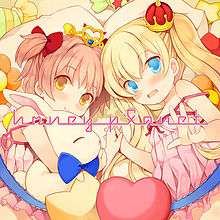Denpa song

Denpa song (電波ソング) is a type of Japanese music that is intentionally strange and catchy.[1] Common features of denpa songs include intentionally off-key vocals, nonsensical lyrics and an over-the-top tune. Denpa music has grown into a subculture within Japan, forming a significant aspect of otaku culture and has large numbers of doujin circles and music artists dedicated to denpa music. Denpa is not a specific genre in itself, but rather an umbrella term for various kinds of music.[2][3][4]
Alternative terms for denpa music coined in recent times include Akiba-pop and A-pop. The term Moe song (萌えソング) specifically refers to denpa music of otaku origin featuring moe themes.
Origins
The term denpa song is a slang term that describes quirky, weird music. The term "denpa" (電波, "electromagnetic waves") originally arose in the 1990s to describe quirky individuals who often daydream and live in their personal fantasies, and derives from the Fukagawa Street Murders in 1981. The assailant, Kawamata Gunji, was using illicit substances when he slashed random bystanders in broad daylight, killing two housewives and two toddlers, and injuring many others. When confronted in court, he explained that electromagnetic waves (denpa) were telling him to kill people, and pleaded insanity.[5] By the early 1990s, the term "denpa" began to appear throughout music and literature, and the phrase "denpa-kei" (電波系) was used to describe delusional, creepy people or crazed lunatics as a derogatory euphemism, based on the idea that such people could hear voices, see things and communicate through telepathy as a result of electromagnetic waves. Examples of such usage at the time include songs by the Japanese metal band KING-SHOW which made references to the murder incident.[4]
In regards to music, the term obtained a negative connotation, and was mainly associated with music that was considered creepy, and had incomprehensible lyrics, often of otaku origin. Since otaku were often seen as strange people who behaved differently from others, denpa became widely associated with otaku culture in Japan and the Akihabara scene. Eventually "denpa" began to encompass anyone who seemed quirky or out of tune with reality, as if these people were receiving electromagnetic waves, and were being hypnotized or controlled by them. As time progressed, the denpa song categorization of music began to take form, and such music became popular amongst otaku circles as a niche interest and lifestyle separate from the mainstream.[4][3]
Characteristics
 |
Tamiyasu Tomoe - Dakko Shite Gyu! ~Nanji Tonari no Yome wo Aise~
Excerpt from "Dakko Shite Gyu! ~Nanji Tonari no Yome wo Aise~" by Tamiyasu Tomoe, demonstrating a upbeat, fast-paced denpa song. |
| Problems playing this file? See media help. | |
 |
kana - Hammer wo Denpa-songu ni shite mita
Excerpt from "Hammer wo Denpa-songu ni shite mita" by kana, an example of denpa music which uses nonsensical lyrics alongside a catchy tune. |
| Problems playing this file? See media help. | |
Denpa songs consist of music with lyrics and tunes that are extremely awkward and strange but people are still drawn to listen to it anyway, with the rationale that the music has "hypnotized" the listener, and that they are now under control by the strangeness of the song. This feeling of being poisoned and brainwashed by the song is described as doku-denpa (毒電波, "poisoning electromagnetic waves"). Denpa songs often contain lyrics that are nonsensical or contain otaku-related themes. Common themes that are touched include things related to delusions, telepathy or insanity, and often such songs contain chaotic or repetitive lyrics to the point of creepiness. In terms of music, denpa songs often feature repetitive chants or off-key singing alongside a catchy melody, and intentionally give an "over-the-top" or "excess" feeling. High-pitched vocals, wotagei cheers and other various extremes build towards the chaos which characterizes denpa. An example of such music is Neko Mimi Mode, which is a song with the phrase "Neko Mimi Mode" repeated over and over as the lyrics. Denpa music may also be conflated with various other musical subgenres, such as gamewave, bitpop and chiptune music.[6][3]
Denpa songs are often mis-characterized as cute and happy, since a large number of denpa music involve over-the-top moe themes which are extremely happy, cute and sometimes fast-paced, however this is not always the case, as they may also include much darker themes. One misconception of denpa music is that it is a type of "cute J-Pop", a label which is inaccurate since it is a largely underground trend, is not popular mainstream music, and has a completely different scene to that of J-Pop. Denpa was in early days associated mainly with creepy music, and as a result became largely frowned upon amongst the mainstream and remained confined to niche otaku groups. Under17 was a popular band which made songs that were musically cute with quirky lyrics, and these songs altered the external perception of denpa music.[6]
Subculture
Denpa albums are often sold by artists at events such as Comiket, and other large gatherings of people interested in otaku-related culture. Denpa music is often used in the opening and closing themes of television anime series; examples include the opening themes of Shinryaku! Ika Musume and Kill Me Baby.
Notable artists associated with denpa music
- Mosaic.wav
- ave;new project
- KOTOKO
- IOSYS
- Band Ja Naimon!
- t+pazolite
- Nomico
- Dempagumi.inc
- Momoiro Clover Z
- ULTRA-PRISM
- I've Sound
- Under17
- Megumi Hoshina
- Nanahira
- Camellia